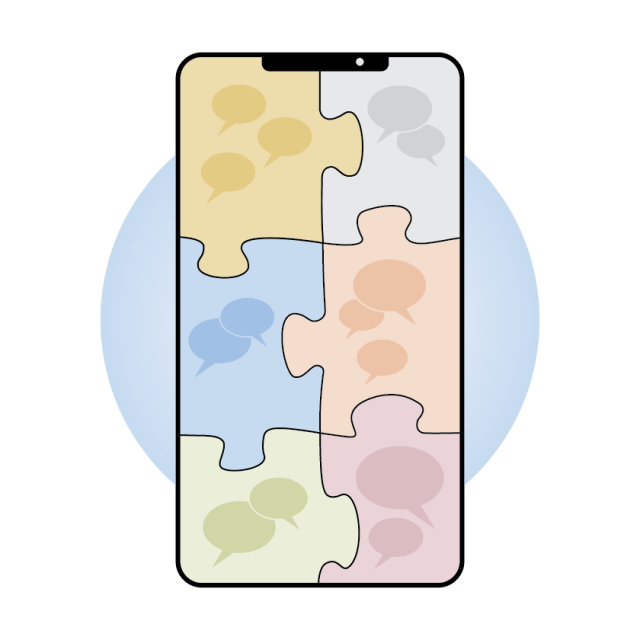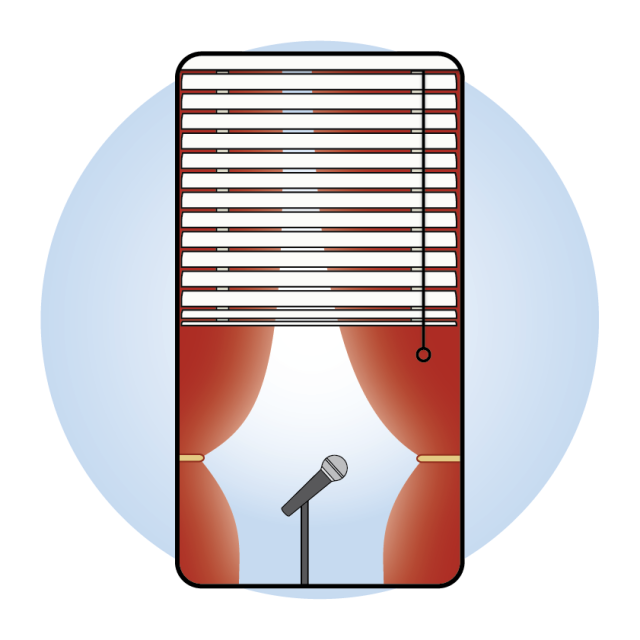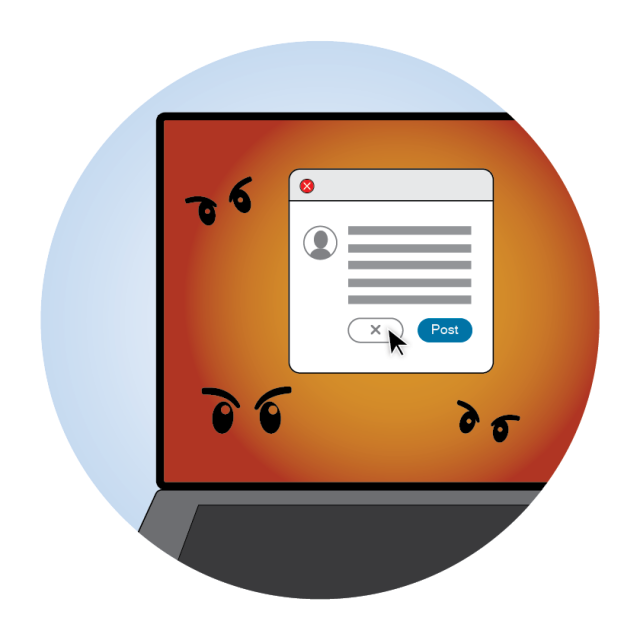Life on Social Media Platforms, in Users’ Own Words
In focus groups, highly engaged social media users describe the purposes that different platforms serve for them, their choices about what to reveal and how they try to anticipate any hostile reactions that could be lurking

Behind each sweeping exploration of the role social media plays in society stand the unique stories of Americans and their online lives. People bring deeply personal needs to social media, and their experiences play out in deeply personalized ways, tied to the platforms and communities they are part of. These platforms can host nearly any imaginable human encounter or emotion, from powerful self-expression and deep connection to intense hostility and ruinous deceit.
To gain insight into people’s experiences and the platform environments that shape them, Pew Research Center conducted a series of five focus groups from July 11 to 13, 2022. They were designed to capture how the participants – all of whom were especially engaged on social media platforms – might navigate the complexities of their online worlds.
The discussions shed light on topics that are difficult to cover with surveys alone: How do people create the social media environment they hope to enjoy? What choices and calculations do they make about what to reveal, where to reveal it and who might be watching? How do the platforms that companies provide shape the experiences they have?
The views of these 23 U.S. adults – called “highly engaged users” throughout this report as shorthand – are not representative of all social media users or other populations. These individuals:
- Used multiple platforms frequently: They said they used at least three social media sites and apps, each at least a few times a week;
- Frequently shared things or commented when using social media: They said they frequently used social media to share things about themselves, share things other people have posted or comment on others’ content – either almost every time they used it or often;
- Found posting on social media important for self-expression: They said social media was extremely or very important to them in this way.
No single “social media experience” emerged from their stories – instead, participants’ accounts were nuanced and unique. Still, common themes arose from the group discussions, each connecting diverse experiences across platforms:
Their stories highlight the ways navigating social media can both enrich and complicate people’s lives. Together, they form a detailed snapshot of what life on platforms looked like for these highly engaged users – grounded in the personal experiences of the people behind the screens and the platforms that shaped these experiences. (It should be noted that the groups took place before changes in Twitter’s ownership and as debates about TikTok were just heating up.)
This report describes findings from five live, online focus groups with a total of 23 U.S. adults, conducted from July 11 to 13, 2022. Pew Research Center worked with SSRS to conduct the groups, which were designed to capture the experiences of people who are especially engaged on social media platforms.
All of them were recruited from the SSRS Opinion Panel. To be eligible, they had to meet the following criteria making up the definition of a “highly engaged user” used in this report:
- Used multiple platforms frequently: They said they used at least three social media sites and apps, each at least a few times a week;
- Frequently shared things or commented when using social media: They said they frequently used social media to share things about themselves, share things other people have posted or comment on others’ content – either almost every time they used it or often;
- Found posting on social media important for self-expression: They said social media was extremely or very important to them in this way.
For more details on other eligibility criteria, recruitment and group composition, read the Methodology.
Center researchers developed a recruitment screener and discussion guide with assistance from SSRS, who partnered with InsideOut Insights (IOI) to conduct and moderate the groups.
While these groups are not representative of any broader population, participants were selected in order to achieve a mix of demographic characteristics (e.g., age, gender, race and ethnicity, education, urbanicity and political party). Four groups were organized by either race and ethnicity or political party, while the other did not have additional demographic criteria. The discussion guide was the same for all groups.
Center researchers observed the focus groups and reviewed both the recordings and the transcripts from these groups to identify key themes and quotes. This report is meant to illustrate the variety of views and experiences of focus group participants, not the frequency with which these views and experiences came up. Views expressed by participants have not been fact-checked and are not representative of the overall experiences of any of these groups in the U.S. population. Quotations have been lightly edited for grammar and clarity.
Here are the key takeaways from the focus groups, featuring participants’ quotations (lightly edited for grammar and clarity) related to each of these themes.
What? Where? When? Using different platforms for different purposes

Our surveys have long shown that some people use a variety of online platforms – some of them very frequently – and that these are places for everything from staying in touch with loved ones to navigating contentious conversations. In the focus groups, two highly engaged users described how their use of platforms can make up the puzzle pieces of a highly customized online life.
“Twitter is more serious for me. Snapchat is a playground. We just get on there and post a bunch of goofy, great filters. … Then Facebook is more of a neighborhood or a village in a way. You can create your own set of, I guess, people that understand you. … Instagram … is a picture book. … [Twitter is] politics and world events. I get a lot of news on my Twitter.”
– Woman, 20s
“Facebook is just mainly to just get in contact with my mom in Messenger. … YouTube is more entertainment. I also use it to learn more things because there’s just a bunch of information on YouTube, which you also have to be careful because a bunch of that is misinformation. And then TikTok is also mainly for entertainment for me. … For Instagram, it’s more friends and Facebook is more family.”
– Woman, 30s
In the discussions, participants described how platforms served different purposes for them and helped them connect with different audiences. One participant described looking for specific things on TikTok, while another used it mostly to disconnect from life’s pressures; another turned to Twitter to follow politics; still others mentioned using platforms for entertainment or as a way to find solutions to problems they were dealing with.
Several highly engaged users described Facebook as a place to connect and interact with others, and one woman discussed how she uses different platforms for different groups of people in her life. A range of platforms came up throughout the discussions, including some beyond those the research initially set out to explore.
Community and connection: Finding the ‘social’ in social media

A recurring high note for some participants in the focus groups related to finding community, support and connection on social media platforms. Two participants described ways that interactions on platforms both surprised them and added value to their lives – allowing them to connect with people both online and offline.
“I like Facebook because of the different groups that you can join. … And it lets you know that you’re not alone on whatever it is that you’re experiencing. You’re not on the earth by yourself. … It lets you know that even though you may be facing something, you may see it in a group or see it on a post that somebody else … overcame it and it lets you know that you can too.”
– Woman, 50s
“I put a post out on … both Nextdoor and Facebook, and I was shocked at the outpouring of help I got. People said, ‘Hey, you don’t live that far from me. I’m a notary. I’d actually be happy to stop by and help you.’ … It was nice. It was a real good experience with social media. It was nothing but positive.”
– Man, 50s
One man described how TikTok helped him to feel less alone amid the pandemic; another used Nextdoor to tap into the local community. When it comes to keeping in touch with people who matter to them, one woman discussed how Facebook served as a way to find connection and maintain long-distance relationships. Another user, adding his experience on a streaming platform, described how connection could have both upsides and downsides.
How much of the ‘real me’? Navigating authenticity and self-expression

These highly engaged users described vastly different approaches to self-expression on social media, ranging from full authenticity to being highly reserved to aspiring to present their best selves. Participants discussed how forthcoming they felt they could be on platforms, what they want people to take away from their social media presence and how this connects with their offline self.
Two participants highlighted the extremes of a continuum when it comes to how much their social media presence reflects who they are offline – from putting everything out there confidently to drawing a sharp distinction between the “real” self and the social media self.
“I truly feel I’m the same person on social media and when you meet me. I’m definitely one of those people who pride myself in that. … [I use] the same tone, the same attitude, the same emotions, everything is the same for me.”
— Woman, 30s
“I definitely don’t think anyone would ever know the real me from social media, like probably 25% [of] me.”
— Man, 40s
Some participants said they like being an open book and “living out loud”; others were more reluctant or selective. One user described keeping things “vague,” while others talked about letting their personality shine through or spreading positivity. Especially in one group, several women described using social media platforms to call attention to injustice and stand firm to their views:
Who’s out there? Tailoring social media posts to different audiences in different places

For some participants in the focus groups – all of whom used multiple platforms frequently – their decisions about what to reveal and how much to share were tied to specific platforms and who would see what they posted on each. Some saw certain places as more suitable than others for some types of content, and made their decisions about what to post accordingly – for example, using multiple platforms to control who saw what. Still others said they only share things in places they feel are more private.
“I think on social media it’s more curated. I show what I want people to see. I mean, depends on what social media. Like Facebook, it’s very like prim and proper … [on] Instagram … I can go more into my political views, my social views and things like that.”
— Woman, 20s
“I use Instagram versus Facebook to separate friends and family. [I put] stuff I don’t want my family to see on Instagram and stuff I don’t want my friends to see on Facebook. And then my getaway from it all would be YouTube just [to] learn about random stuff.”
— Man, 20s
“I like privacy. … I don’t post a lot of things that I don’t want people to know. And I feel like I just want to share that with my family. That’s why I created a special group with them.”
— Woman, 20s
In deciding where to post, several participants described their calculations about how “public” certain platforms seem – even as the platforms offer a variety of privacy settings – and took note of who might follow them on each site. For example, one man in his 20s described feeling more cautious about Facebook, where “everybody’s watching,” while Instagram allowed him to take advantage of the fact that he could share things with less permanence.
Exposed and at risk: Anticipating possible attacks

In recent years, our survey research has explored why some people are reluctant to post on social media about political and social issues, how the public views cancel culture, and whether people think viewpoints are censored on social media.
The focus groups provided insight into risk calculations people might make as they navigate contentious environments, as well as the broader consequences users thought could arise from posting in a relatively public forum. Participants’ worries included concerns around being “screenshotted”; feeling like they have a target on their back; fearing for their reputation; and wondering if what they say might get them banned from a platform. Some of them described these concerns in response to questions about posting political views specifically:
“I don’t [share about political or social issues] online. If I do anything online, it would be … a thumbs up or a dislike, and that’s it. I would just keep it at that, because posting something would just turn into an argument, and I just don’t have the time and energy to continue, because it’s a losing battle anyway.”
— Man, 40s
“People screenshot [things others say]. And take the private [conversation] out of private and make it public. It’s not safe [to express political views].”
— Woman, 20s
“[I think that] Facebook … [has] gotten so much worse with [banning you or locking your page]. … They will remove your post before they even let you know that you’ve made a mistake. And then they won’t even halfway give you a chance to kind of plead your case.”
— Woman, 30s
One woman discussed being verbally attacked on Facebook, while another described how the Nextdoor communities she was a part of differed based on where they were. Other participants talked about seeing some platforms as particularly combative, or the repercussions they might face in terms of their reputation or from the platforms. Some also talked about the possibility of being monitored or that social media posts could be used against them.
Listen, CEO: Changing social media
for the better

To close out the focus groups, participants were asked how they would want those who run social media companies to troubleshoot some of the problems they see: If a CEO of a social media company you use were sitting with us right now, what would you tell them to change to make their platform better for you and the people you know?
Some responses covered issues from what speech is allowed on the platforms to prioritizing user wellness and protecting younger users.
“I would say [to Facebook’s CEO and others, I want] … a stronger stance combating authoritarian views and support.”
– Man, 50s
“Give me a time limit. … Once I reach my time limit, lock me out.”
– Woman, 50s
“I would say everyone who is on social media needs to [meet] an age requirement.”
– Woman, 30s
Other users provided different takes on these themes – some to particular CEOs while others for social media platforms broadly:
Design and illustrations by Peter Bell. For more details on how this research was conducted, read the Methodology. This essay is a collaborative effort based on the input of many individuals.





